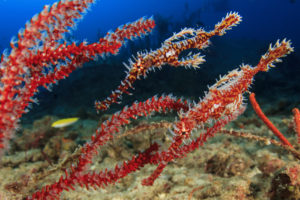Within the pipefish family, the handful of species known as ghost pipefish are quite special. Photographers and muck divers alike delight in seeing these small and often well-camouflaged fish. Most species tend to float head-down and feed on tiny crustaceans. Here we’ll look at four famous species of ghost pipefish.
Ornate ghost pipefish

Also known as harlequin ghost pipefish, the ornate ghost pipefish is actually quite common. They are masters of camouflage, and can display a mix of black, yellow, red or transparent colors. These fish often hide in feather stars or sea fans, matching closely the color of their background. They make for spectacular photos with their spikes and color range. Divers can find them from the Red Sea to the tropical Indo-Pacific, mainly in shallow waters and often around reefs.
Robust ghost pipefish
Robust ghost pipefish are the largest in the family and can reach up to 7 inches (17 cm). They look quite similar to seagrass, which makes them difficult to spot. They usually float around with seagrass and also rock back and forth with water movement, just like seagrass. Colors vary from brown to green to yellow. Divers can find them from the Red Sea to the tropical Indo-Pacific, mainly in shallow waters and often around reefs.
Velvet ghost pipefish
This one is a rare find and has not even been classified properly yet. Their body color, texture and shape mimics sponges, and they are usually brightly colored, from pink to red to purple. They live most commonly around sponge corals that they use to hide. Scientists know very little about this species and have yet to describe it. These are a rare find and you will usually see them around the Indo-Pacific.
Halimeda ghost pipefish
This is the smallest of ghost pipefish, reaching a maximum size of about 2.4 inches (6 cm). Its name comes from the algae Halimeda, as its body looks similar to the plant. It is usually green but can be red or white, resembling the algae it is using to camouflage. Divers can find them in the Western Indo-Pacific and Indian Ocean. They’re difficult to spot as they’re usually hovering motionless with an algae background.

